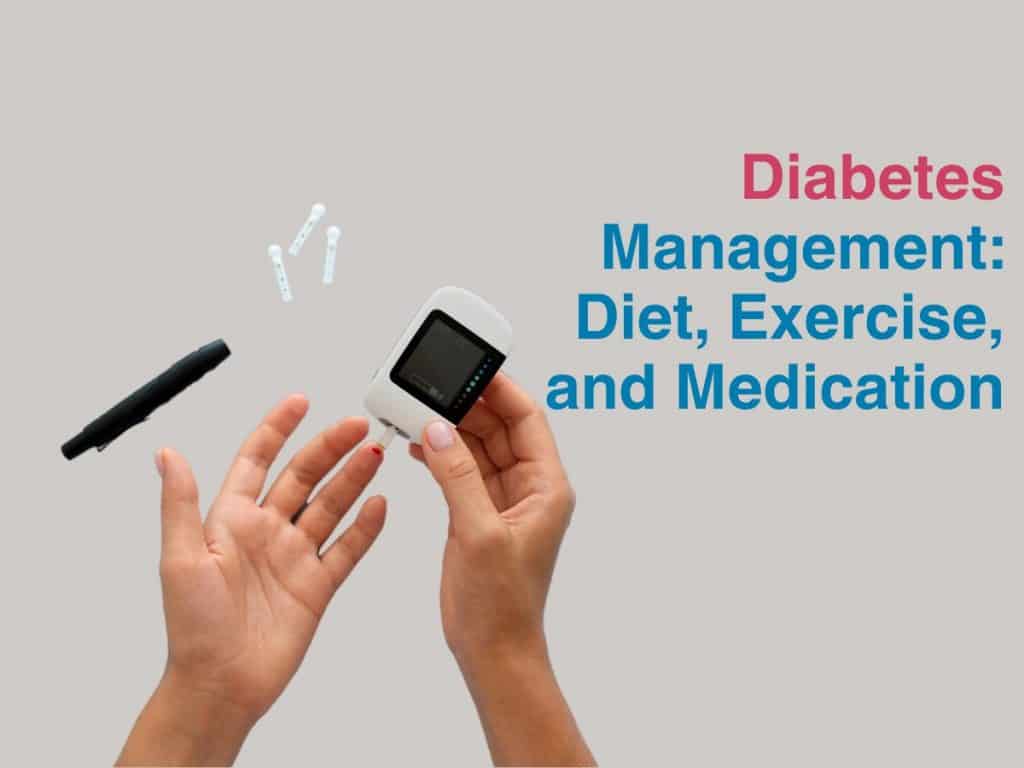
Diabetes Management: Diet, Exercise, and Medication

Diabetes almost feels like life imprisonment for some, but the reality is that it is possible to live a full and comfortable life even after a diabetes diagnosis.
But, managing diabetes effectively requires a comprehensive approach that includes diet, exercise, and medication.
Each component plays a crucial role in maintaining blood sugar levels and overall health.
In this article, we’ll explore the best diet for managing diabetes, the benefits of regular exercise, foods to avoid, natural management strategies, and how to choose the right medication.
Best Diet for Managing Diabetes
A well-balanced diet is vital for managing diabetes. The key is to focus on nutrient-rich foods that help control blood sugar levels.
High-Fiber Foods: Incorporate whole grains, fruits, vegetables, and legumes. Fiber slows down the absorption of sugar and helps regulate blood glucose levels.
Healthy Fats: Include sources of unsaturated fats like avocados, nuts, seeds, and olive oil. These fats improve insulin sensitivity and heart health.
Lean Proteins: Opt for lean meats, poultry, fish, tofu, and low-fat dairy products. Protein helps in maintaining muscle mass and provides sustained energy.
Low-Glycemic Index Foods: Foods like non-starchy vegetables, whole grains, and legumes have a low glycemic index, causing a slower rise in blood sugar.
Foods to Avoid for Diabetes Patients
Certain foods can cause spikes in blood sugar levels and should be limited or avoided.
Sugary Beverages: Avoid sodas, energy drinks, and fruit juices, as they cause rapid increases in blood sugar.
Refined Carbs: Limit intake of white bread, pastries, and other processed carbohydrates.
Trans Fats: Found in fried foods, baked goods, and some margarine, trans fats can increase the risk of heart disease.
High-Sodium Foods: Excessive salt can lead to high blood pressure, a common issue for people with diabetes.
Benefits of Regular Exercise for Diabetes
Exercise is a powerful tool in diabetes management.
It enhances insulin sensitivity and helps control blood sugar levels.
Improved Blood Sugar Control: Physical activity helps muscles absorb glucose, reducing blood sugar levels.
Weight Management: Exercise aids in weight loss and maintaining a healthy weight, which is crucial for diabetes management.
Cardiovascular Health: Regular exercise strengthens the heart and improves circulation, reducing the risk of heart disease.
Enhanced Well-Being: Physical activity boosts mood and energy levels, alleviating symptoms of depression and anxiety often associated with diabetes.
Natural Ways to Manage Diabetes
In addition to diet and exercise, several natural strategies can support diabetes management.
Herbal Supplements: Some supplements, like cinnamon, berberine, and fenugreek, have shown potential in lowering blood sugar levels.
Stress Reduction: Practices like yoga, meditation, and deep breathing can help reduce stress, which negatively affects blood sugar levels.
Adequate Sleep: Prioritize good sleep hygiene, as poor sleep can impact insulin sensitivity and blood sugar control.
Choosing the Right Diabetes Medication
Medications are often necessary to manage diabetes effectively. It’s important to understand how different medications work and choose the right one with your doctor.
Metformin: Often the first medication prescribed for type 2 diabetes, it decreases liver glucose production and increases insulin sensitivity.
Sulfonylureas: These drugs stimulate the pancreas to produce more insulin.
GLP-1 Receptor Agonists: These medications increase insulin secretion and decrease appetite.
Insulin Therapy: Essential for type 1 diabetes and sometimes necessary for type 2, insulin helps regulate blood sugar levels directly.
Conclusion
Effective diabetes management requires a multifaceted approach that includes a balanced diet, regular exercise, and appropriate medication. By understanding how to make healthy dietary choices, incorporating physical activity into daily routines, and working with healthcare providers to find the right medication, individuals with diabetes can lead healthy, fulfilling lives. Always consult with a healthcare professional to tailor these strategies to your individual needs.
Frequently Asked Questions

Dr. Ramya C. Valiveru
MBBS, MS (General Surgery, JIPMER) M.Ch (Endocrine & Breast Surgery – Gold Medalist, SGPGI)
Consultant Breast Oncologist & Endocrine Surgeon







